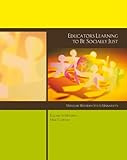Educators Learning to Be Socially Just (Missouri Western St.U-CPSX)
Educators Learning to Be Socially Just (Missouri Western St.U-CPSX)

In 2007-2008, Mike Flowers and I taught EDU 202/203 and EDU 308 together at Missouri Western State University, and with EDU 203, there was a field-based component consisting mainly of observations in schools. We wanted to find a good field experiences book for our students’ observations at the elementary, middle, and high school levels focusing on social justice and the “isms†in the field of education because we were concerned about serious issuesâ€"often ignoredâ€"in schools such as racism with the students in “Jena 6†and heterosexism with the Columbine students. We wanted our students to learn how to handle the “isms†appropriately and how to address serious problems as teacher leaders before the problems erupted on a larger, more dangerous scale, and we wanted some curriculum materials and observation activities to guide their thoughts and actions as pre-service teachers and later on as teachers in the schools. However, we quickly discovered there were no field or lab books to help our students watch for the “isms†and develop strategies for being socially just educators in the field with activities for the elementary, middle, and high school levels. The closest field experience book, that we could find, was Learning to Teach: A Critical Approach to Field Based Experiences by Natalie G. Adams, Christine M. Shea, Delores D. Liston, Bryan Deever (2006). Although we like this book, it does not address the three different school levels for activities which our students needed, and it did not address the “isms†at the cultural, institutional, and individual levels which we desired our students to understand. After we discovered the hole in the area, we became interested in writing this book, so our students could use it as well as anyone else who may be experiencing a field clinical and who might be interested in developing strategies for social justice. Our ultimate goal and hope is to have more socially just and socially aware educators in the field, so injustices are dealt with in the classrooms. Also, we hope all students are taught whole class strategies about the “isms,†so there are fewer and fewer incidents of injustice in the schools for teachers to encounter.
~ Elizabeth Hendrix
Reference Adams, N., Shea, C., Liston, D., & Deever, B. (2006). Learning to teach: A critical approach to field experiences (2nd ed.). New Jersey: Lawrence Erlbaum Associates.

Price: $ 39.77
More Educators Products
No comments:
Post a Comment